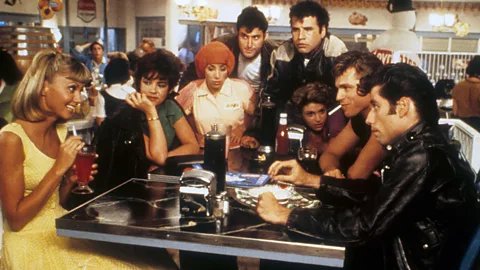Popularity at work still matters whether we like it or not
 Alamy
AlamyMitch Prinstein analyses how our workplaces have evolved to reinforce "high school" popularity based on status
If your workplace sometimes feels frustratingly like re-living high school all over again, that may not be a coincidence.
Psychological research suggests that the same popularity dynamics that we remember from adolescence are not altogether different from the social rules that continue to govern our lives as adults.
Of course, we don’t often talk about our professional relationships in terms of “popularity”, but just like in high school, in most workplaces there are those who are most accepted, rejected, neglected, and controversial. And remarkably, our positions within this social hierarchy still matter more than we may ever have thought.
 Getty Images
Getty ImagesWhat’s at stake?
People who are well-liked are more likely than their equally-qualified counterparts to be hired, promoted, and even earn higher salaries. They are also more likely to feel satisfied at work, happier at home, and less likely to suffer from addictions, depression, and anxiety.
Recent finding from US-based academics, Julianne Holt-Lunstad and Timothy B. Smith from Brigham Young University and J Bradley Layton from University of North Carolina at Chapel Hill revealed that our likeability may even have consequences for our physical health, with those least accepted almost twice as likely to die than others – a mortality risk that is about as powerful as the effects of smoking on our health.
In other words, popularity still matters, whether we like it or not. For those looking to get ahead, it pays to consider whether we act in ways that earn us favourable regard among colleagues or whether we alienate our peers.
Unfortunately, likeability is not the only kind of popularity many strive for. Many, in fact, seek to become more popular by raising their “status” – a second form of popularity that emerges in adolescence.
While likeability is based on a person’s ability to make others feel valued, included, and happy, status is based on attention, power, influence, and visibility. Anyone who went to high school or secondary school can recognise the distinction between these two forms of popularity.
The alpha students had high status – everyone knew them, and some wanted to be just like them – but they weren’t necessarily well-liked. In fact, many loathed the “coolest” kids in school, just like among adults. (Think Sandra Bullock and Tom Hanks versus Kim Kardashian and Donald Trump for instance.)
 Getty Images
Getty ImagesHow many ‘likes’ do you have?
Status used to be a form of popularity that we cared deeply about as teenagers, but quickly grew out of. Many workplaces emphasised team productivity, valued collaboration, and collegial office environments.
But there has been a shift: today, it has become far too easy to remain suspended in adolescence forever, desperately seeking status instead of likeability. Consider social media, for example – a virtual popularity contest that allows anyone to seek status through likes, retweets and followers. With every post, we now can enter a status lottery, just as our business profiles, websites, and articles are seemingly only valued for their ability to generate traffic and hits.
Some changes in the way we now work in 2017 may also have helped to create the perfect set up for the return of status. Open office working and more relaxed dress codes, for instance, have offered more opportunities for workers to observe social interactions and status hierarchies more explicitly.
 Getty Images
Getty ImagesAs Western work culture has increasingly valued autonomy and individuality, fewer people prioritise working together productively and instead focus on looking more important than their neighbours.
Of course, an increasing obsession with status comes with consequences. Research reveals that those with status are more aggressive, more prone towards risky behaviour, and less capable of empathy, compassion, and perspective-taking.
Those with high status as teens are at greater risk of relationship difficulties and loneliness decades later, just as those who seek status as adults never feel fully content – their self-esteem is only as stable as the continued reminders of their status they seek.
Corporations continue to inherently reward status, with professional titles, expansive offices, and management organisational charts that reify the power and influence hierarchy.
 Getty Images
Getty ImagesSo it is especially important for those in corporate environments to remember that it is one’s likeability that ultimately leads to success. Our high-status colleagues may offer directives that we dutifully follow, but ideas offered by those most likeable will generate far greater buy-in, allegiance, and team cohesion.
So, how do you become more likeable? Based on my own interviews and talks with corporations the answer is to make others feel valued, included, and happy. There are countless ways to do so – here are a few particularly effective ones.
- Invest in people by praising others, learning about their goals, and offering time for colleagues to feel socially connected to one another, beyond their common profession. A high-status leader dispenses with pleasantries, favouring power-assertion as a way to motivate others. But a likeable leader expresses interest in their direct reports as people, increasing their investment, loyalty, and persistence to succeed.
- In meetings, be the last to speak up, and reflect upon what others have contributed before offering your own ideas. Simply letting others know they were heard, and that their comments shaped your own thinking, makes others feel valued and their contributions taken seriously. Ideas expressed towards the end of a meeting, reflecting on others’ contributions, are more likely to get pick-up and buy-in than the suggestions made early in a discussion because they are regarded as the result of a collaboration rather than the command of one domineering blow-hard.
- People often report that the person they liked the most made them laugh and brought fun to their daily lives. But everyone can’t be the life of the party. Instead, try to remember one detail about each co-worker, and ask them about it from time to time. Nothing makes us feel more connected than when someone takes time out of their busy schedule to enquires about our lives, and ask us how we are feeling. This one simple compassionate and genuine act is remarkably powerful in gaining trust, building camaraderie, and helping others feel like they are an important member of your group.
Mitch Prinstein is the author of Popular: The Power of Likability in a Status-Obsessed World. He is also the John Van Seters Distinguished Professor and Director of Clinical Psychology at the University of North Carolina at Chapel Hill.
